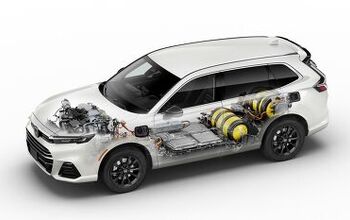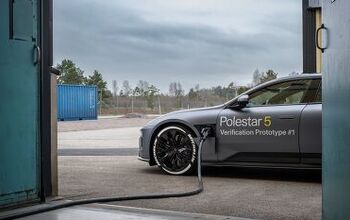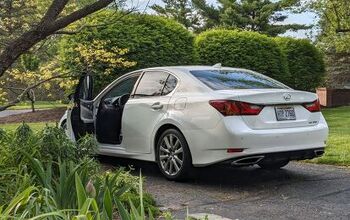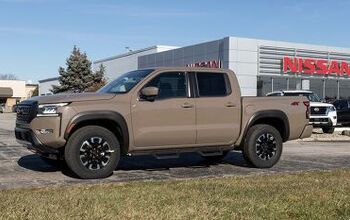GM Expands Shop-Click-Drive Online Car Buying Program Nationally
The way that the auto industry uses the traditional independent dealer sales channel and proposed alternatives to that process have prompted considerable debate here at TTAC recently. While industry followers watch Tesla’s attempt to change the way automobiles are retailed with their factory owned outlets, General Motors is doing its part to change the retail sales equation, or at least make the negotiating process a bit more user friendly. If buyers want to, they can now complete the entire car buying process and even take delivery without ever stepping foot in a traditional dealership. However, GM says that the program is there to complement the existing retail dealer sales channel, not replace it. According to Automotive News, by the end of 2013, GM will expand the Shop-Click-Drive online shopping program nationally.
Shop-Click-Drive has been running as a pilot program in eight states since 2012. It allows car buyers to buy vehicles, from initial inquiry to arranging final delivery, all online. Dealers are part of the process since Shop-Click-Drive is accessed through their own websites, not GM’s, but it’s clear that one of the features of the program is eliminating the perceived hassle of negotiating with a dealer that some people experience when buying new cars.
GM spokesperson Ryndee Carney said that the program will be available by the end of the year at all of GM’s 4,300 U.S. dealers. “Consumers increasingly want to do some degree of car-buying online,” she said. Interestingly, very few of the customers using the pilot program opted for a completely dealer-free experience. While about 900 vehicles were sold through Shop-Click-Drive, only five buyers opted to do the complete process online and take delivery without visiting a dealer. For all the complaints consumers have about car dealers, some people apparently still prefer some human interaction in their commerce. “People still want a relationship,” Carney said.
The program has five steps:
1. Check inventory and pick a car or truck.
2. Get your trade-in value appraised.
3. Apply for credit.
4. Select options and extended warranties.
5. Schedule delivery either at the buyer’s destination of choice or pick it up at the dealer.
More by TTAC Staff
Latest Car Reviews
Read moreLatest Product Reviews
Read moreRecent Comments
- Bd2 Eh, the Dollar has held up well against most other currencies and the IRA is actually investing in critical industries, unlike the $6 Trillion in pandemic relief/stimulus which was just a cash giveaway (also rife with fraud).What Matt doesn't mention is that the price of fuel (particularly diesel) is higher relative to the price of oil due to US oil producers exporting records amount of oil and refiners exporting records amount of fuel. US refiners switched more and more production to diesel fuel, which lowers the supply of gas here (inflating prices). But shouldn't that mean low prices for diesel?Nope, as refiners are just exporting the diesel overseas, including to Mexico.
- Jor65756038 As owner of an Opel Ampera/Chevrolet Volt and a 1979 Chevy Malibu, I will certainly not buy trash like the Bolt or any SUV or crossover. If GM doesn´t offer a sedan, then I will buy german, sweedish, italian, asian, Tesla or whoever offers me a sedan. Not everybody like SUV´s or crossovers or is willing to buy one no matter what.
- Bd2 While Hyundai has enough models that offer a hybrid variant, problem has been inadequate supply, so this should help address that.In particular, US production of PHEVs will make them eligible for the tax credit.
- Zipper69 "At least Lincoln finally learned to do a better job of not appearing to have raided the Ford parts bin"But they differentiate by being bland and unadventurous and lacking a clear brand image.
- Zipper69 "The worry is that vehicles could collect and share Americans' data with the Chinese government"Presumably, via your cellphone connection? Does the average Joe in the gig economy really have "data" that will change the balance of power?


































Comments
Join the conversation
RE: "Author: suspension guy Comment: You have shown good reasoning and excellent understanding of the subject. I read most of your posts here, but may have missed something. Can you explain why dealers are better for the consumer than buying direct?" It makes no difference because OEMs set up the dealer network and aren't about to screw with it. They certainly aren't going to try to compete with the business people who invested millions to represent the OEMs products through sales and service. What would be the upside? What would be the downside? But in general terms, employees work for OEMs. Dealers are entrepreneurs. Employees trying to operate dealerships have failed miserably in past experiments. Even if the current system isn't perfect in every way, there isn't enough money in the world for the OEMs to buy out their dealers. Competition amongst dealers works in favor of consumers. The FTC likes it that way. But here we have a few who want to call Tesla transformative and successful after a few months of profits largely a result of accounting sleight of hand. I laud them for their efforts and results so far. I'd like them to succeed. But to succeed they will have to decide to either stay a boutique OEM or to try to achieve economy of scale via the mass market. The latter will require entrepreneurial investors as dealers. Auto manufacturing is incredibly capital intensive. Just designing a car and bringing it to market is a daunting and expensive task. To continue to invest in appealing new products over time involves huge capital investment and some home runs and some strike outs over time. Trying to establish a factory owned dealer network would mean Tesla would have to compromise greatly on both the R&D and distribution sides while eating up any cushion the company might have to weather a storm. Musk will go as far as he can, then sell out his company stores to real dealers for huge multiples, while still trying to maintain as much control as possible.
RE: "5 out of 900 How about we watch that space for a bit?" I'll be glad to. Did you watch the failed PriceLine experiment? The failed AutoBids Online experiment? The NUMEROUS Silicon Valley failed experiments? Are you watching TRED? Have you watched the history of One Price? You must think everyone thinks like you. There ARE a lot of young people, unschooled as they are in business, that can't understand why vehicles can't be sold like gadgets. Those folks aren't in any position of authority in their companies so they don't make enough money to be taken seriously anyway. IF they learn enough to become manager material in the real business world, they will have already learned why it doesn't work. But there will always be a Silicon Valley wunderkind ready to finance the next big deal, however. Why don't you find one of those guys to fund YOUR attempt. Then you can tell us about the experience. And we'll watch for a bit longer.